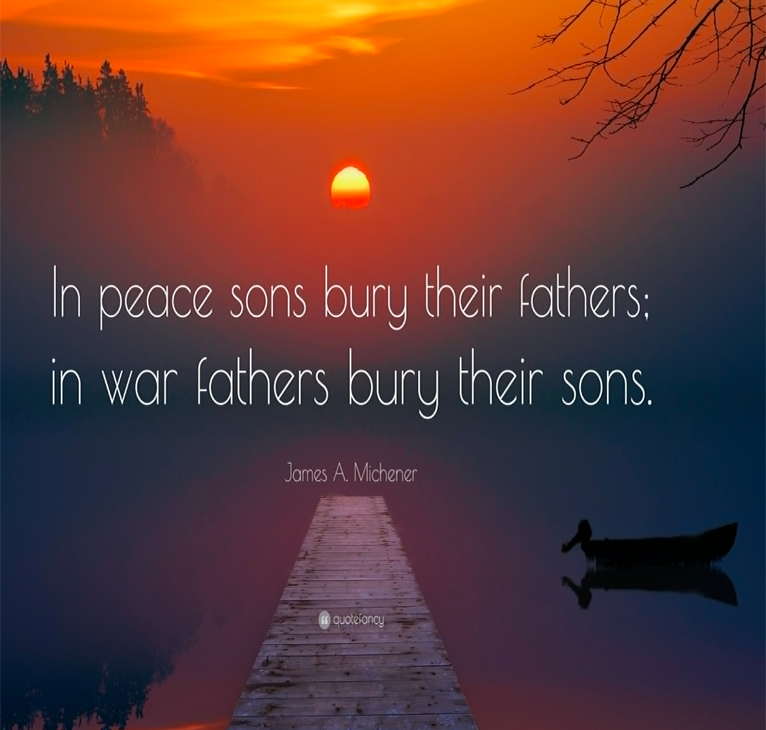War is one of the most catastrophic events that can happen in any society. It brings with it death, destruction, and chaos that can last for generations. It is a time when nations and individuals are forced to make tough decisions that can have far-reaching consequences. One of the most significant costs of war is the loss of human life. Soldiers and civilians alike are killed or wounded, leaving behind devastated families and communities. The quote “During times of peace, the sons bury their fathers, but in war it is the fathers who send their sons to the grave” by Herodotus perfectly captures the tragedy of war and the immense burden it places on parents.
The Burden of Sending Your Son to War
The idea of sending a child off to war is one of the most heart-wrenching decisions a parent can make. The thought of your child being exposed to the horrors of battle, potentially losing their life, and never returning home is unimaginable. It is a decision that no parent should ever have to make, but in times of war, it becomes a harsh reality. The burden of sending a child to war falls mainly on fathers, who are often seen as the primary protectors of their families.

In many cultures, fathers are expected to be strong, unyielding, and always ready to defend their families. During times of war, this expectation is magnified as fathers are called upon to send their sons to fight for their country. It is a responsibility that can weigh heavily on a father, knowing that the decision to send their child to war may result in their death.
In times of peace, children are supposed to bury their parents. However, in times of war, it is the opposite. Fathers must come to terms with the fact that they may be the ones burying their children. The emotional and psychological toll that this burden places on fathers cannot be overstated.
The Tragic Loss of Life in War
The loss of life in war is perhaps the most significant tragedy of all. It is not just the soldiers who are killed, but also civilians who are caught in the crossfire. Families are destroyed, and communities are torn apart. In war, death is not an isolated event; it is a pervasive reality that affects everyone.
The cost of war goes far beyond the immediate loss of life. It extends to the future as well, as the trauma and scars of war can be felt for generations. The quote by Herodotus reminds us of the immense human cost of war, and the toll it takes on those who are left behind.
The Long-Term Consequences of War
The impact of war goes far beyond the immediate loss of life. The psychological and emotional trauma experienced by soldiers and civilians alike can have long-term consequences that are often overlooked. Post-traumatic stress disorder (PTSD) is a common condition among soldiers who have experienced the horrors of war, and it can last for years, even decades after the conflict has ended.
Children who have lost their parents in war may suffer from the trauma of that experience for the rest of their lives. Communities that have been ravaged by war may take years, even generations, to recover.
The quote by Herodotus is a reminder that war is not just about the immediate conflict but also about the long-term consequences it leaves behind. The burden of sending a child to war is not just felt by fathers, but by entire communities that must deal with the aftermath of conflict.
Conclusion
So, what does this quote mean for us today? It’s a reminder of the profound impact of war and the devastating cost that it has on families and communities. It is a sobering realization that in times of war, young men and women are sent off to fight and die while their families are left to grieve and mourn. It also highlights the immense responsibility of those who lead us in times of conflict, who must make difficult decisions and live with the consequences of those decisions for the rest of their lives.
In the end, Herodotus’ quote serves as a powerful reminder of the true cost of war and the importance of striving for peace. It encourages us to work towards a world in which sending our children off to war is not the norm and in which the sorrow and pain of burying loved ones becomes a thing of the past. It reminds us that the true victory is not in defeating our enemies, but in building a world in which war is unnecessary and peace can thrive.
In conclusion, Herodotus’ quote, “During times of peace, the sons bury their fathers, but in war, it is the fathers who send their sons to the grave,” offers us a poignant reminder of the true cost of war and the importance of peace. It highlights the profound impact of war on families and communities and calls on us to work towards a world in which war is no longer necessary. May we honor the sacrifices of those who have given their lives in service, and strive to build a more peaceful world for future generations.









